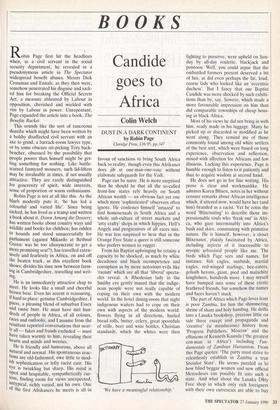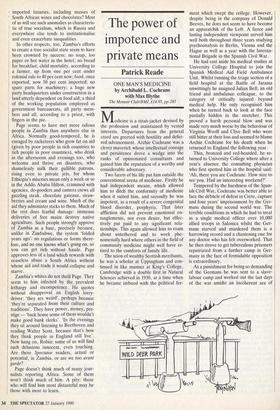BOOKS
Candide goes to Africa
Colin Welch
DUST IN A DARK CONTINENT by Robin Page Robin Page first hit the headlines when, as a civil servant in the social security department, he revealed in a pseudonymous article in The Spectator widespread benefit abuses. Messrs Dick Crossman and Ennals, as they then were, somehow penetrated his disguise and sack- ed him for breaking the Official Secrets Act, a measure abhorred by Labour in opposition, cherished and wielded with vim by Labour in power. Unrepentant, Page expanded the article into a book, The Benefits Racket.
This sounds like the sort of rancorous diatribe which might have been written by a bolshy disaffected civil servant with an axe to grind, a barrack-room lawyer type, or by some obscure nit-picking Tory back- bencher, obsessed by the possibility that People poorer than himself might be get- ting something for nothing. Like battle- scarred farmyard mousers, such lid-lifters may be invaluable at times, if not usually attractive. They are rarely distinguished for generosity of spirit, wide interests, sense of proportion or warm enthusiasms.
Robin Page is not at all like this. As the blurb modestly puts it, 'he has led a colourful and varied life'. Since being sacked, he has lived as a tramp and written a book about it, Down Among the Dossers; has written books about country ways and wildlife and books for children; has ridden to hounds and stood unsuccessfully for Parliament (against Mikardo at Bethnal Green: was he too idiosyncratic to get a more promising seat?); has travelled exten- sively and fearlessly in Africa, on and off the beaten track, as this excellent book shows; divides his time now between farm- ing in Cambridgeshire, travelling and writ- ing.
He is an immediately attractive chap to meet. He looks like a small and cheerful brown bear. Even his accent is reassuring, if hard to place: genuine Cambridgeshire, I guess, a pleasing blend of suburban Essex and rustic burr. He must have met hun- dreds of people in Africa, of all colours, races and outlooks, and I assume from the resultant reported conversations that near- ly all — fakes and frauds excluded — must have taken warmly to him, revealing their hearts and minds and worries.
He is friendly and humorous, above all natural and normal. His spontaneous reac- tions are old-fashioned, owe little to mod- ish sophistication or lefty racist cant. His eye is twinkling but sharp. His mind is open and hospitable, sympathetically cur- ious, finding room for views unexpected, untypical, richly varied, not his own. One of the first Afrikaners he meets is all in Claridge Press, £16.95, pp.347
favour of sanctions to bring South Africa back to reality, though even this Afrikaner does jib at one-man-one-vote without elaborate safeguards for the Volk.
Page can be naive. He is more surprised than he should be that all the so-called front-line states rely heavily on South African wealth — an obvious fact yet one which more 'sophisticated' observers often ignore. He confesses himself 'amazed' to find homosexuals in South Africa and a whole sub-culture of street markets and 'arty crafty' shops in which hippies, Hell's Angels and. progressives of all races mix. He was less surprised to hear that in the Orange Free State a queer is still someone who prefers women to rugger.
From his Baptist upbringing he retains a capacity to be shocked, as much by white decadence and black incompetence and corruption as by more notorious evils like. 'racism' which are all that 'liberal' specta- cles reveal. A Rhodesian lady in the Smithy era gently mused that the indige- nous people were not really capable of coping on their own with the modern world. In the hotel dining-room that night indigenous waiters had to cope on their own with aspects of the modern world: flowers flying in all directions, hurled bread rolls, butter, celery, great spoonfuls of trifle, beer and wine bottles. Christian standards, which the whites were then 'We have a meaningful relationship.' fighting to preserve, were upheld on Sun- day by all-day roulette, blackjack and pontoon. Well, you could argue that the embattled farmers present deserved a bit of fun, as did even perhaps the fat, loud, coarse lady who looked like an 'eccentric duchess'. But I fancy that our Baptist Candide was more shocked by such exhibi- tions than by, say, Soweto, which made a more favourable impression on him than did comparable townships of cheap hous- ing in black Africa.
Most of his views he did not bring in with him, ready made in his luggage. Many he picked up or discarded or modified as he went along. They remind me of those commonly found among old white settlers of the best sort, which were based on long experience, observation and reflection, mixed with affection for Africans and few illusions. Lacking this experience, Page is humble enough to listen to it patiently and thus to acquire wisdom at second hand.
He does not go in for fine writing. His prose is clear and workmanlike. He admires Karen Blixen, notes in her without censure remarks about African intelligence which, if uttered how, would have her (and him) branded as a racist. Yet he coins the word `Blixenating' to describe those im- pressionable souls who 'freak out' in Afri- ca, who gaze interminably into Africa's bush and skies, communing with primitive nature. He is himself, however, a closet Blixenator, plainly fascinated by Africa, including aspects of it inaccessible to myopic urbanised people like me. The birds which Page sees and names, for instance: fish eagles, sunbirds, martial eagles, red-winged starlings, bee-eaters, goliath herons, giant, pied and malachite kingfishers, hundreds more. I may myself have bumped into some of these exotic feathered friends, but somehow the names and faces haven't stuck.
The part of Africa which Page loves least is poor Zambia, for him the shimmering shrine of sham and holy humbug. He drifts into a Lusaka bookshop, precious little on sale there except arid propaganda and `creative' (ie mendacious) history from 'Progress Publishers, Moscow' and the effusions of Kenneth Kaunda ('the greatest con-man in Africa') including Fun- damentals of Zambian Humanism. From this Page quotes: 'The party must strive to relentlessly establish in Zambia a true Socialist State'. He seems puzzled as 'to how blind beggar women and new official Mercedeses can possibly fit into such a state. And what about the Lusaka Ditty Free shop in which only rich foreigners with their own currencies are able to buy
I imported luxuries, including masses of ' South African wines and chocolates? Most of us will see such anomalies as characteris- tic of true socialism, which in Russia and everywhere else tends to institutionalise and even exacerbate inequalities.
In other respects, too, Zambia's efforts to create a true socialist state seem to have been crowned by success: no soap, loo paper or hot water in the hotel; no bread for breakfast; child mortality, according to a farmer, up from one per cent under colonial rule to 40 per cent now; food, once exported, now 50 per cent imported; no spare parts for machinery; a huge new party headquarters under construction in a land utterly dependent on food aid; a third of the working population employed as government bureaucrats, all party mem- bers and all, according to a priest, with fingers in the pie.
Page seems to have met more odious people in Zambia than anywhere else in Africa. Normally good-tempered, he is enraged by racketeers who grow fat on aid (given by poor people in rich countries to rich people in poor countries), who drink in the afternoons and evenings too, who welcome and thrive on disasters, who shamelessly milk their gullible patrons, rising even to private jets, for whom Ethiopia's miseries mean only a week or so in the Addis Ababa Hilton, crammed with agencies, do-gooders and camera crews all guzzling steak, chocolate gateaux, straw- berries and cream and wine. Much of the aid they administer sticks to them. Much of the rest does fearful damage: immense deliveries of free maize destroy native agriculture. Such people strongly approve of Zambia as a base, precisely because, unlike in Zimbabwe, the system 'folded years ago': no regulations or forms there- fore, and no one knows what's going on, so you can get rich without hassle. Page approves less of a land which rewards with ceaseless abuse a South Africa without whose aid and trade it would collapse and starve.
Zambia's whites do not thrill Page. They seem to him infected by the prevalent lethargy and incompetence. He quotes without disapproval an English lorry- driver: `they are weird', perhaps because 'they're separated from their culture and traditions'. They have power, money, pre- stige — 'back home some of them wouldn't
make good bank clerks'. 'In the evenings they sit around listening to Beethoven and reading Walter Scott, because that's how they think people in England still live'. Now hang on, Robin: some of us will find such delusions innocent, even touching. Are there Spectator readers, actual or potential, in Zambia, or are we too avant garde?
Page doesn't think much of many jour- nalists reporting Africa. Some of them won't think much of him. A pity: those who will find him most distasteful may be those with most to learn.



























































 Previous page
Previous page